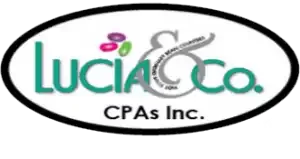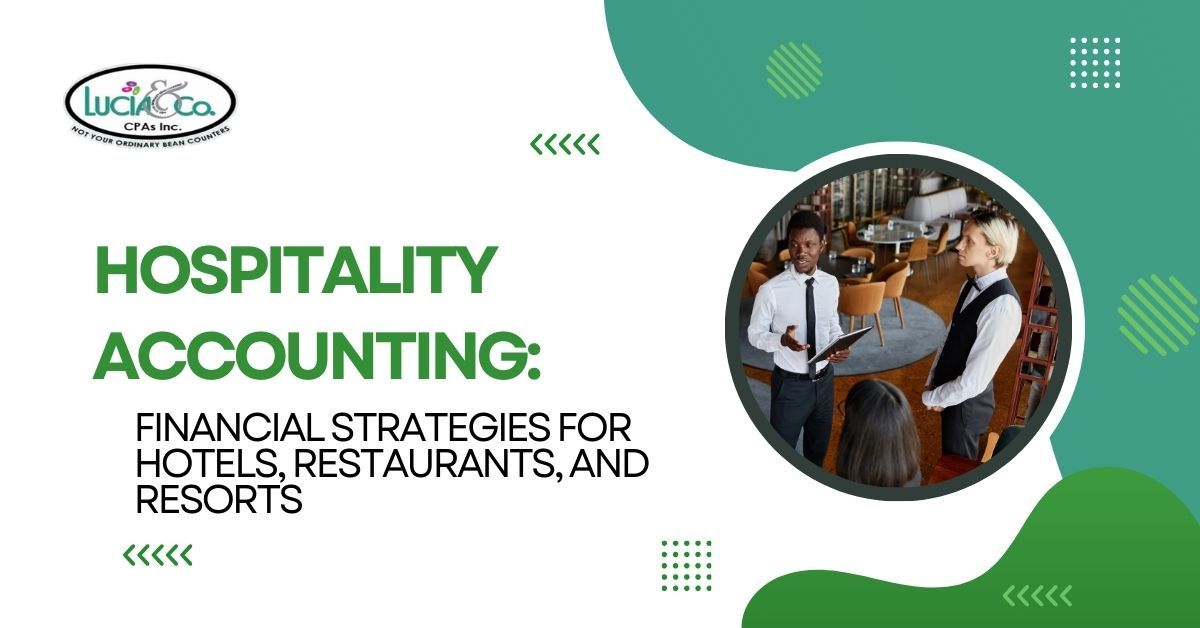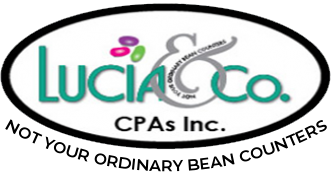Key Takeaways:
-
Industry-Specific Focus: Hospitality accounting addresses the unique financial challenges of hotels, restaurants, and resorts, including fluctuating revenue, seasonal demand, and labor complexities.
-
Critical Financial Components: Effective hospitality accounting includes revenue segmentation, cost control, payroll and tip management, and inventory tracking to support accurate financial decisions.
-
Regulatory Compliance & Taxation: Specialized systems ensure compliance with occupancy and sales taxes, tip reporting, labor laws, and strategic depreciation.
-
Benefits of Outsourcing: Partnering with specialized CPAs reduces costs, improves accuracy, provides access to advanced tools, and allows businesses to scale financial services as needed.
-
Strategic Value: Implementing tailored accounting practices helps hospitality businesses streamline operations, improve financial visibility, and make data-driven decisions.
The hospitality industry is a dynamic and fast-paced environment where customer satisfaction, efficient operations, and financial precision intersect. Whether you’re managing a hotel, resort, or restaurant, keeping your financials in order is critical for long-term success. This is where hospitality accounting becomes not just a necessity, but a strategic advantage.
In this guide, we’ll explore the fundamentals of hospitality accounting, its unique challenges, key components, and why working with specialized CPAs can give your hospitality business the edge it needs.
What Is Hospitality Accounting?
Hospitality accounting refers to the specialized financial management practices designed for the hospitality sector, including hotels, resorts, restaurants, bars, event venues, and even short-term vacation rentals. Unlike general accounting, hospitality accounting focuses on fluctuating revenue streams, seasonal demand, high employee turnover, and tight profit margins—all while maintaining an exceptional customer experience.
From tracking room revenue and food costs to payroll and inventory control, this type of accounting is a tailored solution built to accommodate the complexities of guest-facing businesses.
Why Specialized Accounting Matters in Hospitality
The hospitality industry is not like retail, construction, or healthcare. Financial reporting in hospitality often involves variable income sources, dynamic cost structures, and real-time financial decision-making. Here’s why industry-specific accounting is crucial:
- Multiple Revenue Streams: Restaurants, spas, events, room bookings, and loyalty programs all need accurate tracking.
- High Volume, Low Margin: Small percentage differences can make or break a business.
- Labor-Intensive Operations: Tracking employee hours, tips, and benefits can be complex.
- Compliance and Taxes: Hotels and restaurants deal with sales tax, occupancy tax, and tip reporting.
Without a robust hospitality accounting system in place, even profitable operations can struggle due to mismanaged cash flow or compliance issues.
Key Components of Hospitality Accounting
To properly manage finances in the hospitality industry, there are several core components to address:
1. Revenue Management and Segmentation
Revenue segmentation is essential to understanding where your profits are coming from. In hotels, this could mean breaking down revenue by room type, service (e.g., spa or food and beverage), or customer segment (e.g., corporate vs. leisure). Restaurants may segment by dining, bar sales, or catering services.
Proper revenue tracking helps in:
- Budget forecasting
- Promotions and pricing strategies
- Performance evaluation by department
2. Expense Tracking and Cost Control
Labor and food costs are two of the biggest expenses in the hospitality industry. Hospitality accounting allows managers to break down expenses into direct and indirect costs and monitor them against revenue.
Key areas include:
- Cost of Goods Sold (COGS)
- Labor Cost Analysis
- Utility Bills
- Maintenance & Repairs
- Marketing and Advertising
Effective accounting enables real-time cost monitoring, helping businesses make timely adjustments.
3. Payroll and Tip Management
One of the most complex aspects of hospitality accounting is managing payroll. This includes:
- Shift differentials and overtime
- Tip pooling and allocation
- Employee benefits
- Contractor vs. full-time distinctions
Improper payroll practices can result in IRS penalties and low staff morale. A solid accounting system ensures that employees are paid fairly and that the business remains compliant with labor laws.
4. Inventory Management
Restaurants and hotels need a constant supply of consumables—whether it’s food, linens, or toiletries. Poor inventory control can lead to waste, theft, or missed sales opportunities. Integrating inventory management with your accounting system provides a real-time snapshot of:
- Stock levels
- Spoilage and shrinkage
- Ordering schedules
- Vendor performance
Unique Challenges in Hospitality Accounting
While all businesses face financial challenges, the hospitality industry comes with its own set of hurdles:
Seasonal Revenue Fluctuations
Many hospitality businesses experience peak and off-peak seasons. This volatility makes budgeting and cash flow management more challenging. Accounting systems must account for these fluctuations and help maintain financial stability year-round.
High Staff Turnover
The hospitality industry often has high employee turnover, increasing the complexity of payroll, benefits tracking, and training costs. A streamlined payroll system integrated with your accounting software helps manage these issues efficiently.
Guest Disputes and Refunds
Hotels and restaurants occasionally deal with customer complaints that may require refunds, chargebacks, or adjustments. Accurately recording these within your accounting system ensures transparency and aids in financial reconciliation.
Regulatory Compliance
From food safety standards to labor laws and occupancy taxes, hospitality businesses must adhere to a host of regulations. Non-compliance can lead to fines or lawsuits, making it essential for accounting systems to incorporate legal safeguards and audit trails.
Hospitality Accounting Software: What to Look For
Choosing the right accounting software is a vital step in ensuring financial health. When selecting a system for hospitality accounting, look for these features:
- Integration with POS systems and booking platforms
- Real-time reporting dashboards
- Payroll and time-tracking modules
- Tax compliance tools
- Multi-location support for chains or franchises
- Cloud-based access for remote management
Popular platforms like QuickBooks, Xero, and Sage offer hospitality add-ons, but working with a CPA who specializes in the industry can help tailor your setup to meet specific needs.
The Importance of Financial Reporting
Robust financial reports give owners and managers insight into operations. Some essential reports in hospitality accounting include:
- Profit and Loss (P&L): Helps evaluate overall profitability
- Daily Revenue Reports: Track room occupancy and restaurant sales
- Cash Flow Statements: Identify shortfalls or excesses
- Departmental Reports: Provide granular performance data for kitchens, front desks, bars, etc.
- Labor Cost Reports: Ensure payroll expenses align with revenue
By analyzing these reports, decision-makers can optimize pricing, staffing, and procurement strategies to boost profitability.
Tax Considerations in the Hospitality Industry
Taxation in hospitality goes beyond standard business income tax. Here are a few key areas that specialized hospitality accountants help navigate:
- Occupancy Tax: Collected from guests on lodging services
- Sales Tax: On food, beverages, and retail items
- Tip Reporting: Employees must report tips for tax purposes, and employers have related obligations
- Depreciation: Hotels and restaurants invest heavily in fixed assets that require strategic depreciation planning
Having a knowledgeable accounting partner ensures compliance with IRS regulations and maximizes eligible deductions.
Benefits of Outsourcing Hospitality Accounting
For many hospitality businesses, outsourcing their accounting makes more financial sense than maintaining an in-house team. Here are a few advantages:
- Cost Savings: No need for full-time salaries, training, or benefits
- Industry Expertise: Gain access to professionals who understand the nuances of hospitality
- Scalability: Easily adjust services as your business grows or contracts
- Advanced Technology: Outsourced firms often use the latest tools for efficiency and compliance
Partnering with a firm that specializes in hospitality accounting means fewer errors, better insights, and more time to focus on running your business.
Why Choose Lucia & Co. CPAs, Inc. for Hospitality Accounting?
The hospitality industry requires more than just bookkeeping—it requires deep industry insight, strategic thinking, and absolute precision. At Lucia & Co. CPAs, Inc., we offer tailored hospitality accounting solutions designed to streamline your operations and optimize your profitability.
Whether you’re operating a boutique hotel, a busy restaurant, or a nationwide hospitality brand, our experienced team understands the unique financial pressures you face. From managing fluctuating revenue streams to ensuring compliance with complex tax laws, we provide full-spectrum accounting services so you can focus on delivering unforgettable guest experiences.
Contact Lucia & Co. CPAs, Inc. today to discover how our hospitality accounting expertise can help your business thrive in a competitive marketplace.




